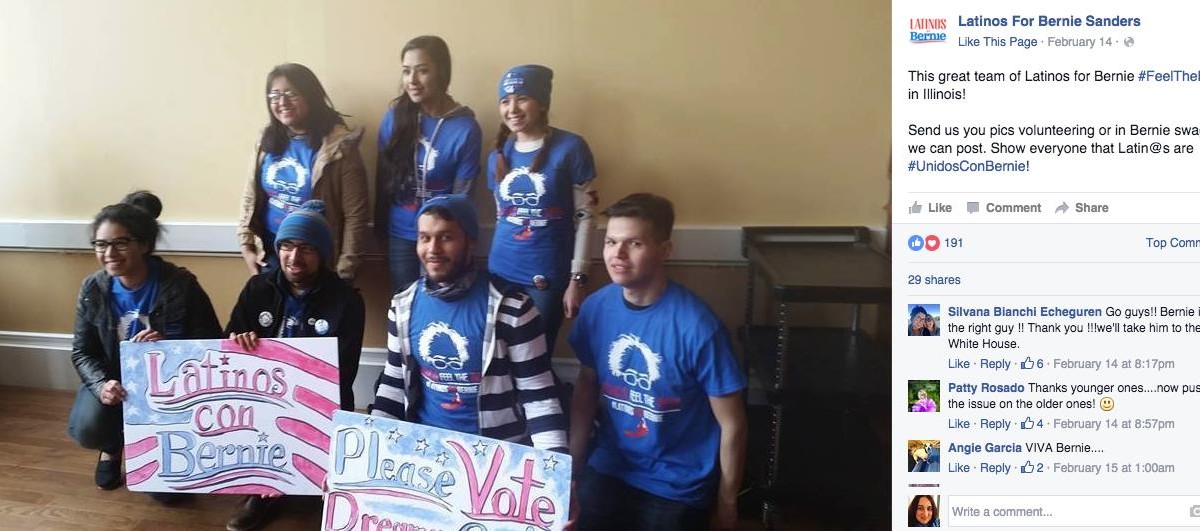 Julie Diaz-Asper, Founding Partner & CEO at Social Lens Research offers an analysis of the Presidential campaign’s social media outreach to Latinos. The campaigns who do well with Latinos on social media have significant amounts to gain. Latinos helped the Democrats keep the White House in 2012, with 70% voting for Obama. Around 27 million Latinos are eligible to vote this time, with an estimated 13 million expected to vote, an increase of 17% since 2012 (NALEO). Expect to see significant spend and innovation on social outreach to Latinos this election cycle.
Julie Diaz-Asper, Founding Partner & CEO at Social Lens Research offers an analysis of the Presidential campaign’s social media outreach to Latinos. The campaigns who do well with Latinos on social media have significant amounts to gain. Latinos helped the Democrats keep the White House in 2012, with 70% voting for Obama. Around 27 million Latinos are eligible to vote this time, with an estimated 13 million expected to vote, an increase of 17% since 2012 (NALEO). Expect to see significant spend and innovation on social outreach to Latinos this election cycle.
Expectations are high around the Latino vote in the 2016 election. Around 27 million Latinos are eligible to vote, with an estimated 13 million expected to vote, an increase of 17% since 2012 (NALEO). Latinos helped the Democrats win the White House with 70% voting for Obama.
Getting the Latinos to the poll this election cycle is paramount. Yet, targeted outreach to Latinos, especially on social and mobile channels, could use more attention. 64% of Latinos recently polled by Social Lens Research via MocoSpace, a mobile gaming platform, haven’t had any contact with a campaign recently. This low engagement is surprising given that the MocoSpace community tends to over-index on social media and mobile usage. Even more interesting, the survey found Latinos more closely watching the election on social media [36%] than whites [31%] or African Americans [30%], highlighting a potential engagement gap by the campaigns.
A Quick Look at Social Efforts of the Campaigns to Date:
Social media can have large implications for political campaign messaging and candidate perception. For example, Hillary Clinton’s campaign tried to engage Latino Millennials by comparing her to “your abuela,” and the social media community revolted. #NotMyAbuela and #NotMiAbuela hashtags developed, articles in NY Times, Slate and others picked up the anti-abuela campaign, and weeks later, the two hashtags continued to be used by Latinos who don’t support Clinton.
Not many Latino marketers including myself can say we have never tried the abuela angle but it’s much more powerful and way less risky when you have real abuelas involved versus trying to generically speak for them.
The good news is that Hillary Clinton’s social media efforts seem to be transitioning. There was a marked shift earlier this year by the campaign to bring in real voices that could help represent Hillary Clinton better. One great example leading up to the South Carolina primary, showcased the mothers of African Americans killed by police, adding authenticity and credibility to the outreach efforts. It appears to have paid off with higher than expected turnout and share of African American votes. Imagine if Hillary’s campaign would have done the same with real abuelas and Latinos?
To connect more effectively, Hillary Clinton has been using more authentic, in-the-moment photos – that are moving in the right direction.
I also really liked the Dump Trump Geofilter on Snapchat put out by Priorities USA Action, a pac backing Hillary Clinton.
Meanwhile, Bernie Sanders has been mainly sticking to the issues with many direct quotes and videos from his speeches and rallies. Bernie also started well on Snapchat back in November with an adorable grandpa-like post “what is this Snapshot thing and why do I only get ten seconds?” I am not sure if he actually came up with that but it feels like he could have. Since then, the Bernie camp have also done some clever Snapchat geofliters to get out the vote.
Sanders’ strategy seems to be winning on being able to reach younger Latinos who are happy to volunteer and create content for him, checkout Latinos for Bernie on Facebook. Millennials are also helping to sell “El Bernie” to their parents and grandparents. Given that Millennials are close to 50% of the Latino vote (Pew), the youth vote will be critical.
It’s considered unlikely that Bernie Sanders’ social wins will translate into a Bernie win, but a lot can be learned from his campaign’ s reach and engagement success with Millennial Latinos.
On the Republican side, let’s just say it’s been more about alienation than outreach to Latinos. Trump has dominated by using his reality star status, sharp anti-immigrant rhetoric and loyal fans to use Twitter as a personal broadcast tool to dominant the news and get coverage. Trump’s social efforts and huge in-person rallies have taken down the much more experienced, well financed and establishment candidate, Jeb Bush, and made him the forefront leader. What’s unclear is whether Trump’s unfiltered ranting will translate to a wider appeal for the general election. The rest of the Republican pack doesn’t really stand out in their social outreach efforts.
Overall, it’s been a wild ride with social being used by non-established candidates to build a base and following—something no one predicted on either side.
What’s coming next? Honestly, who knows! We do we see a few potential opportunities for campaigns to increase their Latino engagement efforts from the MocoSpace community check-in:
- Latinos Prefer Live Candidate Interactions: Asked how candidates could better connect to them and their friends, live Q & A on social media was most popular [35%] with Latinos, followed by live events with the candidate [34%].
- Alternative Media Offers an Opportunity for Campaigns: Interviews with non-traditional media [bloggers, YouTube stars] scored well with Latinos [32%].
- Optimize Social Media Messages for Mobile: 59% of Latinos think candidates should use social media mobile messages to reach them. Latino interest was much higher than Whites at 53%.
- Voter Registration Outreach Needed By Many Latinos: A quarter of Latinos polled are unregistered or unsure of their status. Some [13%] say they plan to register. Another 15% are eligible but unsure how to register, not clear on their registration status, or have difficulties registering. Resolving these issues with them would benefit candidates.
Whether you are involved in politics or not, it will be important to watch campaign tactics as you can expect significant digital outreach spend and innovation regardless of who wins.
Julie Diaz-Asper is the founder of Social Lens Research. Social Lens has a proven track record of using a mix of social marketing techniques and sound research methodologies to better engage and gain deeper insights (mobile optimized research exercises, focus groups, social contests).Julie has over two decades of experience helping large organizations to innovate and pursue new market opportunities including American Express, AARP, Google Multicultural, Univision, Consumer Reports en Español, Cabot Cheese, Mobile Future, CX Act, HITN, Immersive Youth Marketing and Inspire Agency.











